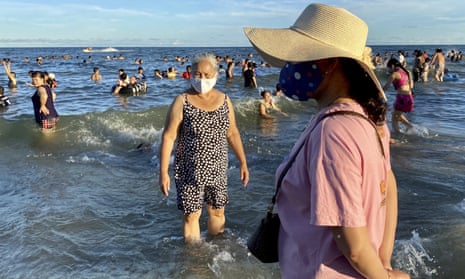Vietnam is evacuating 80,000 people from the central city of Danang and reimposing disease-prevention measures after 15 local coronavirus cases were detected, the first to be recorded in the country for more than three months.
Life had returned to normal for many in the country, which had been praised widely for taking quick action to contain Covid-19 and was on the brink of reaching 100 days without any new local infections. On Saturday, however, a 57-year-old man was confirmed to have tested positive, in the first community infection since April.
Social distancing measures have been introduced indefinitely across Danang, a tourist hotspot, with all religious, sports and cultural events suspended. Wearing masks in public places in the city is now compulsory and gatherings of more than 30 people at public places are banned, the government has said.
The city’s borders were also shut on Monday to inbound domestic tourists, while the authorities said 80,000 people, mostly tourists, would be evacuated through domestic flights to 11 Vietnamese cities. The evacuation will take at least four days, and all people returning from Danang will be required to stay at home for 14 days.
Most foreign travellers are currently banned from entering Vietnam, and anyone who does arrive must stay in quarantine facilities. “It is very well managed, and very well controlled, so if [a new cluster] can still happen here, then it is definitely worrying to other countries that may not have quite as strict policies,” said Todd Pollack, a Hanoi-based infectious disease specialist from Harvard Medical School.
The cases were probably only the tip of the iceberg, he said. “We don’t know the extent of it right now, but we have to assume that there are a lot more people who are carrying the virus,” he said, adding that the cluster showed the need for continued vigilance, even in countries that appeared to have stopped community transmission.
The source of the new cases is not clear, though the cluster has prompted a crackdown on illegal immigration. State media reported that police in Danang had arrested a 42-year-old Chinese man accused of being the head of a criminal group that helps people illegally enter Vietnam from China.
Officials were also quoted by Vietnamese media as saying that at least one of the infections involves a new strain of the virus that has originated outside of the country.
The outbreak in Danang has occurred during the school holidays, when many people were holidaying domestically and taking advantage of discounted travel offers in the city.
There was a risk, said Pollack, that the virus had been carried by travellers to other parts of the country.
The first confirmed patient, the 57-year-old man, had apparently not left the city in recent months. However, he had visited three healthcare facilities and had recently attended a wedding. He visited hospital with a cough and fever on 20 July and is reportedly in critical condition.
Three more cases were confirmed over the weekend, including a 61-year-old man and a 71-year-old woman in Danang and a 17-year-old boy in Quang Ngai province. On Monday evening, a further eleven infections, including seven patients and four medical staff of Da Nang Hospital, were reported.
Vietnam, a country of 96 million people that shares a border with China, has so far recorded 431 cases of Covid-19 and no deaths. It has been praised for its aggressive contact-tracing campaigns, clear public health messaging and quick action.
The country recorded its first cases of coronavirus on 23 January, prompting officials to extend the school holidays to keep children at home, and ban flights to and from China on 1 February. Vietnam was the first country outside of China to introduce a mass quarantine, when on 12 February officials isolated villages about 25 miles (40km) from Hanoi that were home to 10,000 people.
The detection of the new cases comes just as Vietnam is attempting to rebuild its economy, and considering travel bubbles with other low-risk countries.
All transport operators have now been instructed to reintroduce preventative measures, such as checking passengers’ temperatures and installing hand sanitiser dispensers. Passengers on long-distance vehicles must also complete health declaration procedures, local media reported.
